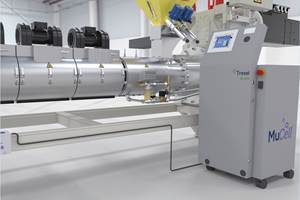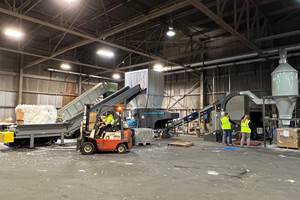PET Reclaimer Moves Downstream
When Nadim Bahou headed Envipco’s West Coast business of granulating PET bottles through “reverse vending machines” in the early 1990s, he saw there was a shortage of PET grinding capacity in the region.
When Nadim Bahou headed Envipco’s West Coast business of granulating PET bottles through “reverse vending machines” in the early 1990s, he saw there was a shortage of PET grinding capacity in the region. Bahou left Envipco in 1997, a year before it closed its California operation, put a second mortgage on his home, and started his own business to grind industrial PET.
He leased a five-acre lot outside Perris, Calif., an industrial town in the desert southeast of Los Angeles. He bought a 125-hp granulator and ground clean post-industrial scrap bottles into flake to sell to sheet extruders.
He was starting small, but he called the company Global P.E.T. because he had big plans. He added a second granulator, then a third and a fourth, then a bale breaker and color sorting equipment to separate green from clear bottles. After 10 years, his company is grinding PET bottles at up to 3500 lb/hr or 25 million lb/yr.
In 2003 California announced “challenge grants” totaling $10 million a year to increase post-consumer recycling. In 2004, Global P.E.T. won a grant of $900,000 toward a washing system that would allow Global to process post-consumer flake as well as post-industrial scrap. “There were rumors of other PET reclaimers going into washing, so I wanted to make the move to protect my business,” Bahou recalls. As a result, his was the first—and so far, the only—PET washing line west of the Mississippi, though others are planned. There are as yet only about a dozen such lines in all of the U.S. and Canada.
In addition to the state grant, Global invested $1 million of its own in the new washing system and hired a recycling consultant, Charles Jones of Advanced Plastic Systems in Westchester, Pa., to advise on equipment selection and installation. The ultimate choice was a friction-washing system from Amut SpA in Italy. The new friction washing and water filtration system started up this past March.
Environmentally friendly
Washing PET flake is normally water-intensive, requiring scalding water, caustic soda, detergents, and anti-foaming agents. The washing solution then must be neutralized and filtered before it can be discharged into sewers. Amut’s diatomaceous-earth filtration and closed-loop recirculation water system reportedly discharges less water than any other commercial system—less than 10 gal/min of clean, neutral-pH water, tested for bacteria and caustic-soda levels. The rest of the water recirculates approximately seven times before it’s bled off into one of two big settling tanks for treatment. The system also uses less than 10% as much caustic and chemicals as some competing systems. Bahou is proud of its environmentally friendly quality: “You shouldn’t try to clean dirty plastic by messing up a lot of water,” he says.
The washing tank is a long drum with a central shaft, friction-generating paddles, and an auger that pulls PET flake off the bottom. Bottle-cap and label flake float off the top. After washing, five large screen-filter disks roughly 4 ft in diam. remove PET fines as a clean sludge. Two “light” fractions are also generated—one consisting of PP cap flake and the other a mixture of PP flake and clean label scrap. PET flake is the most valuable fraction, but all four fractions are saleable.
Today Global runs six days a week, 24 hr a day. Bahou’s next step is to extrude PET sheet. Last year, his elder son Paul, just out of college, wrote a proposal that won a second state grant—this time for $1,950,000. That will allow Global to add an Amut sheet line, due to arrive this month, and to expand and upgrade its grinding and color sorting. Grinding capacity is now only 3500 lb/hr, whereas its washing capacity is 4500 lb/hr.
Global will add a Cumberland 150-hp granulator to replace its smallest unit, bringing total grinding capacity up to 6000 lb/hr—enough to stay ahead of the washing line. Global is also adding a larger color-sorting line from NRT (National Recovery Technologies, Nashville, Tenn.) to separate 7500 lb/hr of green from clear bottles, as well as its first flake color-sorting equipment (from Satake USA, Houston). Satake’s system has two parts—infrared technology to identify PET and eject other substances like PVC, wood, or metal, and a second part with cameras to sort clear PET flake from green, amber, or blue.
Related Content
Foam-Core Multilayer Blow Molding: How It’s Done
Learn here how to take advantage of new lightweighting and recycle utilization opportunities in consumer packaging, thanks to a collaboration of leaders in microcellular foaming and multilayer head design.
Read MoreExtrusion Technology Extended to Injection, Enabling Up to 100% Regrind Usage
Twin-barrel (shot-pot) press can handle more regrind, offers other benefits to molders.
Read MoreBuilding a Future With Sustainable Compounds
With roots in recycling, Star Plastics produces engineering thermoplastic compounds to meet performance and environmental goals.
Read MorePurpose-Built System Enhances Capacity and Flexibility for Recycler
A Boston recycler invested in a turnkey shredding, granulation and elutriation system to expand its plastics reclaim business.
Read MoreRead Next
For PLASTICS' CEO Seaholm, NPE to Shine Light on Sustainability Successes
With advocacy, communication and sustainability as three main pillars, Seaholm leads a trade association to NPE that ‘is more active today than we have ever been.’
Read MorePeople 4.0 – How to Get Buy-In from Your Staff for Industry 4.0 Systems
Implementing a production monitoring system as the foundation of a ‘smart factory’ is about integrating people with new technology as much as it is about integrating machines and computers. Here are tips from a company that has gone through the process.
Read More












